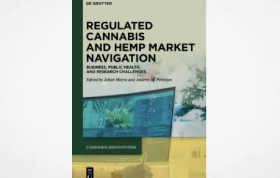Cannabis: The fat lady is about to sing!
By Dr. Paul Crosio
The ease of buying marijuana on the streets of every province in Thailand will soon come to an end, as nearly all parties who contested Thailand’s election are calling for the repeal of the law that famously decriminalized the cannabis plant.
In the absence of strict regulations, the cannabis industry has flourished in Thailand. With over 250,000 growers and more than 4,500 dispensaries selling Ganja in every province, the industry was valued at $1 billion by 2025 by University of the Thai Chamber of Commerce. Thailand has become so notorious for cannabis this is prompting law enforcement agents in other countries to screen returning travelers for cannabis use.
Anutin, who then served as the health minister, made a compelling case for the legalization of the drug. He argued that by legalizing cannabis, it would effectively alleviate prison overcrowding and stimulate the growth of the hemp industry, thereby reducing the poverty rate. Additionally, Thailand aimed to bolster its emerging medicine and culinary sectors, with expectations of generating substantial revenue in the future.
But a lot has changed since Bhumjaithai party quickly won popular support to decriminalize cannabis and hastily implemented it through their partnership with the military-backed government. Chaos followed and abuse of cannabis decriminalisation became rampant.
Most parties in the national election last week, for political or moral reasons, advocated repeal of the decriminalisation and limiting cannabis sale to medicinal purposes.
The popularity of this promised clamp down amongst Thai voters is apparent. Viral videos of stoned schoolchildren, as well as out of control tourists, have outraged a broadly conservative public who now see pre-rolled joints being sold everywhere and openly on the street for less than THB100.
Cannabis has become a political hot topic and we are unlikely to see a sensible outcome. Right or wrong, the view is that little of the supposed riches has flowed to Thai farmers and the recreational markets is seen as being dominated by foreign investors and illegally imported product. Events like the Phuket Ganja Festival and the aborted Kao San Road 420 celebration annoyed a lot of moderate Thais who see these events as abusing the basis for liberalisation of cannabis and embarrassing the country.
Pheu Thai, although second runner overall, won popular support by proposing to immediately relist cannabis as a narcotic while retaining its medical applications and banning all recreational use, which they say is negatively impacting Thai youth. Paetongtarn Shinawatra’s has pulled on the nation’s heartstrings and said, “I don’t want my children to grow up in a country where drugs are easy to find, and cannabis is liberalised”.
The Move Forward Party, now the clear winner in these elections, are known for being progressive in several areas, but on cannabis they support the same approach as Pheu Thai, stating that it is important to wipe out illegal recreational sales and unlicensed growers before gradually expanding medical cannabis again.
Only one party continues strong support for a liberal cannabis regime. Bhumjaithai led by Anutin is aware that the May 14 election results once again places him in a potential kingmaker position, as it did in 2019.
Anutin continues to emphasize that support for a cannabis regulation bill, which notoriously failed to pass in the previous parliament, is crucial to obtaining the Bhumjaithai party’s support. His election posters continue to promise a golden era for the Northeast farmer with cannabis production remaining a core element. According to Anutin, Pheu Thai and various critics from different political backgrounds rallied together to support the removal of cannabis from the narcotics list. However, their actions seemed now more politically motivated as they strategically stirred dissatisfaction during this election, conveniently sidestepping any meaningful discussion about a Cannabis Act that he believes they would eventually support.
Regardless of the party, political direction, or any philosophical view on cannabis it is very obvious regulation and enforcement is coming and long-term industry success sorely needs the certainty that was lacking in the past year.
What is the likely outcome for the industry?
Smart money is on any incoming government redefining “recreational” cannabis as abuse of a narcotic while retaining controlled use of the plant under the Thai Traditional Medicine Act. Preventing recreational use is a common theme of all parties regardless of any credible evidence of negative impact on Thai society and Thai youth.
One commentator summed up the possible future when he said “There’s not really a chance for the law to go backward (but) there’s a high chance of rule-making that would bar people from entering the industry …. think of it like beer … alcohol … it won’t be illegal, but it will be extremely regulated.”
Despite the widespread presence of cannabis, it is important to remember that licenses were always required at every stage of the farm-to-dispensary process.
Even today, dispensaries should be licensed and operate under the “Protection and Promotion of Knowledge on Thai Traditional Medicine Act”. How enforcement plays out and what actual form any regulated use of cannabis takes is still unclear. Controlled models like those run in Switzerland and Germany are more likely to influence policy maker than the Canada legalization model.
Under the current framework, professional growers are also required to obtain commercial licenses that are distinct from those more than 500,000 licenses obtained through the Pluk Ganja app, which was always meant for those wanting to grow cannabis for personal use. Going forward, all growers selling under the Traditional Medicine Act will likely need this commercial license, but ownership will be scrutinised, and any grower will need to apply track and trace procedures as well as follow GACP and GMP standards – putting many thinly capitalised growers out of business.
The great cannabis party is over, and whilst the “fat lady hasn’t sung,” she is waiting in the wings.
To learn more about the legal framework for cannabis in Thailand, please feel free to contact us at [email protected].


















